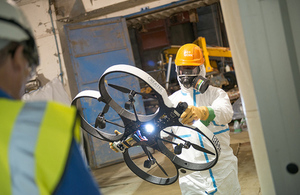Cumbria benefits from strong business links with Japan
Two Cumbria-based companies have secured contracts to support the clean-up of the Fukushima Daiichi nuclear site in Japan, fending off stiff competition from the UK and the rest of the world.

Sellafield has proved to be a test-bed for remote technology developed by Createc and James Fisher Nuclear
Both companies have worked on the Sellafield site, and have benefitted from the close UK-Japan relationships fostered by the Nuclear Decommissioning Authority (NDA) and Sellafield Ltd.
Cockermouth-based research company, Createc, and James Fisher Nuclear (JFN) which has a base close to Sellafield, will develop cutting edge technology to help decommission the Japanese site, which was devastated by a tsunami 5 years ago.
Createc has secured a significant new contract with Mitsubishi Heavy Industries (MHI) to develop a suite of innovative radiation sensors for use at the Fukushima nuclear site in Japan.
It is the only partner working with Mitsubishi on the sensor development aspect of the Fukushima project and it is great recognition of the Cumbria-based team’s ideas.
Dr Matt Mellor, director of Createc, said:
We have a recognised expertise in gamma radiation sensing, measurement and modelling and we’ve been working with the Mitsubishi team for a while.
If all goes well, these sensors will then be commissioned for use at Fukushima to locate and quantify the fuel debris in the primary containment vessels on the tsunami-damaged site.
James Fisher Nuclear (JFN) has also been awarded a new contract by Mitsubishi to develop the cutting edge technology needed to sample radioactive debris sitting below reactor cores at the Japanese plant.
Bertie Williams, Business Director for Nuclear at JFN, said:
For some time JFN has been regarded as an industry leader in this field and this award shows that our expertise and experience is recognised and valued worldwide. It is a challenging task and we are looking forward to working with MHI to design and develop this technology.